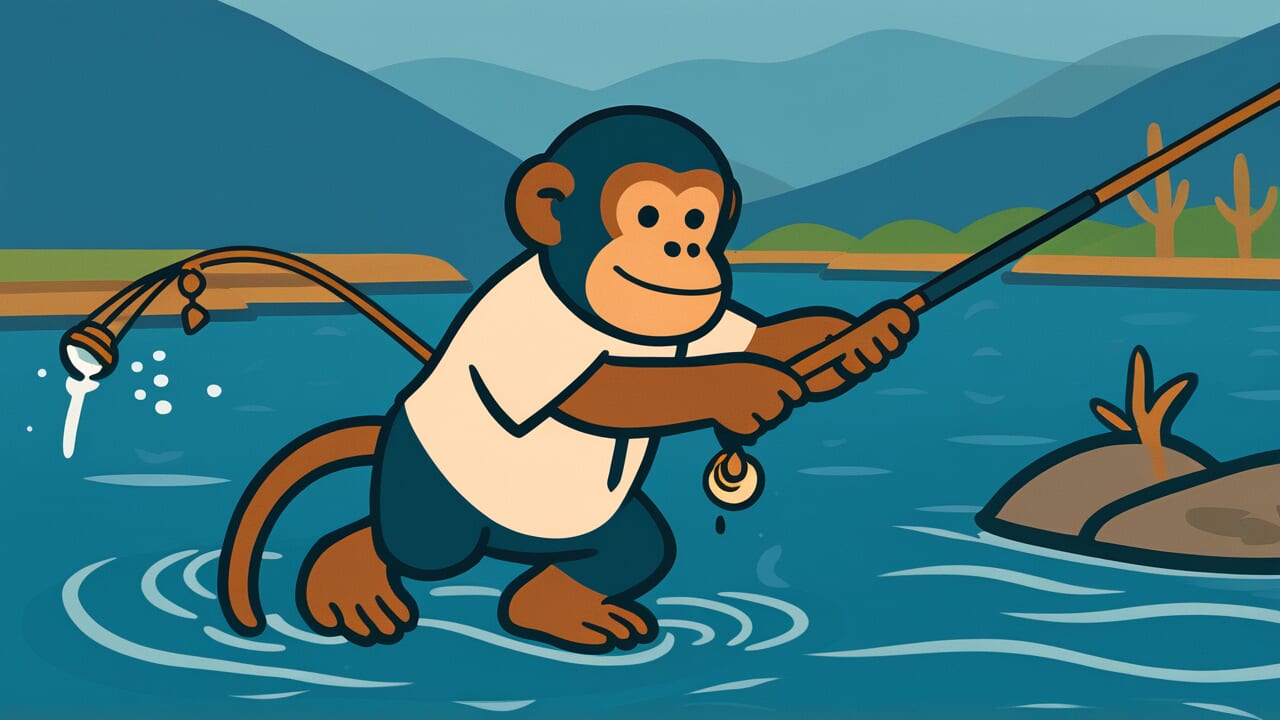How to Read “A monkey fishing”
Saru ga uo tsuru
Meaning of “A monkey fishing”
“A monkey fishing” is a metaphor for failing by imitating others. It means that simply copying surface actions or forms without understanding the essence will not lead to success.
This proverb is used when someone sees another person’s success and tries to copy only their methods.
Without understanding the effort, knowledge, experience, and circumstances behind that success, just copying what you can see won’t produce the same results.
Even if a monkey watches a human fishing and imitates them, it doesn’t understand the essential parts. Why drop the line there? Why wait patiently? What bait should be used? Without this understanding, the monkey won’t catch any fish.
Even today, this proverb warns against superficially copying successful people’s methods without trying to understand their thinking and effort.
It teaches us that mere imitation of form is meaningless. We must learn the essence.
Origin and Etymology
The exact first appearance of this proverb in literature is unclear. However, the structure of the phrase reveals an interesting background.
Monkeys naturally eat fruit in trees and catch insects. They don’t have a habit of catching fish near water.
Meanwhile, fishing is a skill that humans have developed over a long time. It requires using tools, understanding fish behavior, and waiting patiently.
The background of this proverb likely includes elements of monkey cleverness and their admiration for humans.
Monkeys are animals close to humans. They have appeared in Japanese tales and folk stories since ancient times. People have long been familiar with the sight of monkeys observing and imitating human behavior.
However, no matter how skillful a monkey is, it can’t catch fish by imitating only surface actions without understanding the essence of fishing.
This is because invisible knowledge and experience are necessary. How to use tools, how to choose bait, how to identify where fish are.
Through the comical scene of a monkey fishing, this proverb expresses the foolishness of imitating only the surface.
The lesson is embedded in these memorable words. Without understanding the essence, success won’t come from imitating appearances alone.
Usage Examples
- I saw that person’s success and started doing the same thing, but it’s like a monkey fishing—nothing works at all
- Just imitating the surface is like a monkey fishing, so let’s learn the basics properly first
Universal Wisdom
The proverb “A monkey fishing” contains deep insights about human learning and growth.
When people see someone’s success, they naturally want to take shortcuts. They think that imitating successful people will quickly produce the same results, rather than spending time learning the basics.
This psychology is a timeless human trait.
However, true skill and wisdom aren’t just in the visible parts. Behind success lie countless failures, trial and error, deep thinking, and accumulated time.
Surface actions are just the tip of the iceberg. Beneath the water lies vast experience and understanding.
This proverb has been passed down for so long because humans have always struggled with the desire to “succeed easily.”
Our ancestors repeatedly saw people lose to this desire and imitate only the surface. They expressed the importance of understanding essence through the familiar figure of a monkey.
This proverb also serves as a warning to teachers. If you teach only appearances, the other person will end up like a monkey fishing.
It reminds us of the importance of conveying essence and helping others understand why things are done.
When AI Hears This
Crab-eating macaques in Thailand and Indonesia have been observed catching and eating fish and crustaceans in shallow water.
In other words, “A monkey fishing” was just something humans arbitrarily decided was “an impossible foolish act.” In reality, it’s a behavior that can actually happen.
This misunderstanding arose from human cognitive limitations. We can only judge “possibility” within the range of what we’ve seen.
Japanese monkeys don’t catch fish, so the stereotype formed that “monkeys are creatures that eat fruit in trees.” However, in ecology, there’s a known phenomenon called “niche expansion” where organisms change their diet according to their environment.
Crab-eating macaques living near coasts developed water resources as a new food source during periods when forest food was scarce.
What’s even more interesting is that this behavior is culturally transmitted. Only certain groups possess the technique of catching fish, and young individuals learn by observation.
In other words, monkeys have their own “fishing culture.”
What this proverb teaches us is that many things we thought were “impossible” were actually just “insufficiently observed.”
Human common sense is built on surprisingly narrow experience.
Lessons for Today
What this proverb teaches modern people is the importance of learning the essence.
In today’s information-saturated society, success know-how and techniques are easily available. However, they are often just superficial methodologies.
If you imitate without thinking about why they’re effective, what preconditions exist, or whether they apply to your situation, you’ll end up like a monkey fishing.
What matters is the spirit of “more haste, less speed.” Take time to learn from the basics, understand principles, and digest things in your own way.
When you see someone’s success, consider not just their methods but also what thought process led them there.
Also, when you’re in a position to teach something, remember this proverb.
Rather than teaching only the method, convey why you do it and what meaning it has. This allows the other person to reach true understanding.
Don’t chase the surface—grasp the essence. That’s what will guide you to real growth.



Comments